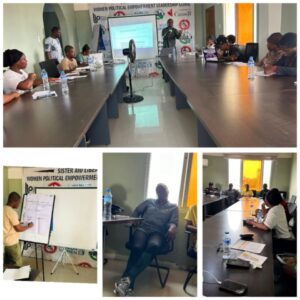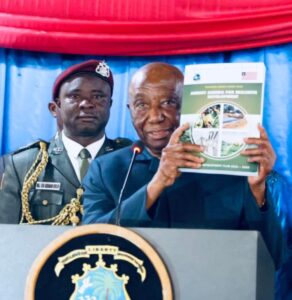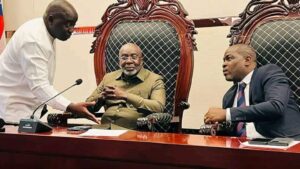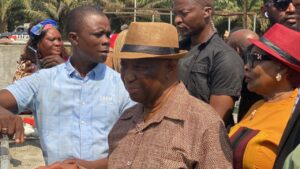EPA Builds Stronger Frontier In Climate Change Fight

EPA Builds Stronger Frontier In Climate Change
Fight
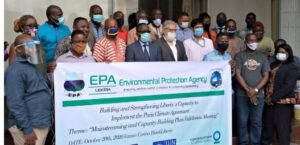
The Executive Director of Liberia’s Environmental Protection Agency (EPA), Professor Wilson K. Tarpeh has renewed the entity’s commitment to the fight against climate change, which impact remains visible across Liberia.
Professor Tarpeh said it is an undeniable fact that Liberia is faced with the devastating impact and consequences of climate change due to the high reliance on climate-sensitive sectors such as energy, agriculture, waste, and forestry.
Speaking recently at the start of a one-day working group consultative meeting at Corina Hotel in Sinkor, Prof. Tarpeh said “we can assure you of our renewed cooperation to build stronger frontiers in addressing the issue of climate change in Liberia.”
Held under the auspices of the EU- Liberia Climate Change Alliance + ProjectLong Term Technical Assistance (LTTA) to Liberia EPA, the consultation meeting was conducted under the theme: “Building and Strengthening Liberia’s Capacity to Implement the Paris Agreement”.
Speaking further at the meeting, Prof. Tarpeh said cases of coastal erosion, sea-level rise, erratic rainfall, flooding, change in weather patterns, extreme temperatures are on the increase and visible thereby triggering the need for collective and urgent attention.
“In 2015, the Conference of the Parties (COP) to the United Nations Framework Convention on Climate Change (UNFCCC) adopted the Paris Agreement where countries committed to a common cause to undertake ambitious efforts to combat climate change and adapt to its effects,” Professor Tarpeh said.
According to him, five years after the Paris Agreement was reached, countries including Liberia are currently revising their climate change action plans referred to as the Nationally Determined Contributions (NDC) to reassess the targets and actions set forth in 2015 and as well set new targets that are realistic to reduce greenhouse gas emission levels and promote sustainable development.
The revision process of the NDC will also take an introspective look at including new and emerging sectors into NDC such as the inclusion of green corridors and other nature-based solutions like the short-lived climate pollutants among others.
The Paris Agreement requires all parties to put together their best efforts to combat climate change through their respective nationally determined contributions.
To this point, the EPA Boss disclosed that the Government of Liberia through the EPA and her partners are committed to ensuring that its revised climate action plan truly reflects the national views, aspirations, actions, and targets set forth to address climate change from a mitigation and adaptation standpoint.
Providing the overview of the meeting, John F. Kannah, Administrative Coordinator of the NDC said the gathering is intended to brain-storm on operational issues affecting the working group; and to produce a work plan for the working group.
Mr. Kannah explained that the meeting would also analyze sector actions and plans and prioritize actions for the revised NDC based on national circumstances and means of implementation.
The workshop was divided into four sessions including the opening session, technical session (Overview of the Workshop, Sector Working Group Overview, and Setting Sector Expectations); question session, and working session.
Mr. Kannah also explained that Liberia joined the NDC Partnership in December 2018. By mid-2019, the NDC Partnership received an application from Liberia under round one of the Climate Action Enhancement Package (CAEP), he disclosed.
Liberia’s CAEP application included 14 requests and are supported by Conservation International, the International Renewable Energy Agency, UNDP through the Climate Promise, and the EU-Climate Alliance +.
Liberia’s NDC revision began with desk review supported by the NDC Partnership through Conservation International, on potential NDC activities that led to the inclusion of 4 other sectors (Green Corridors, Fisheries, Coastal Zone, and Short-Lived Climate Pollutants) that were not in the first INDC.
EU-Liberia Climate Change Project Expert, KumehAssaf in a presentation on the overview of the sector working group said a study conducted by UNDP and Petra Resources Inc finds out that most of the issues around climate impact management are rather ad hoc.
“The national policies are weak, often not localized and that institutional readiness is dismal for the most part”, Mr. Assaf quoted the National Capacity Assessment for Managing Climate Change Impact in Liberia.
He also noted that good governance is essential to maintaining country ownership, momentum, and help to ensure the quality of NDC implementation.
Good governance, according to Mr. Assaf includes determining which party is responsible for driving progress and coordinating activities, defining processes and structures for decision-making, ensuring inclusive stakeholder engagement,
and maintaining strong political will at the highest levels.
For his part, Manuel Fuentes, EU-Liberia Climate Change Project Leader did a presentation on ‘Setting sector Expectation’. His presentation was followed by questions and answers from stakeholders who attended the gathering held at a local hotel in Monrovia.
